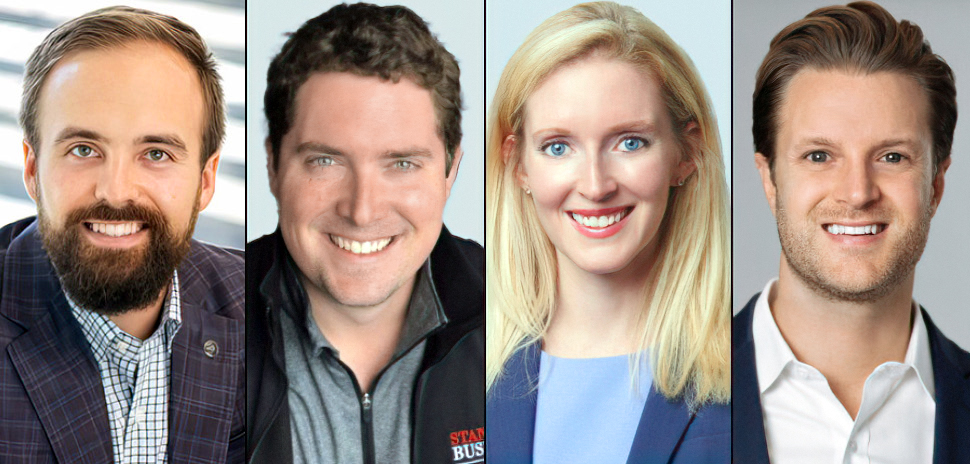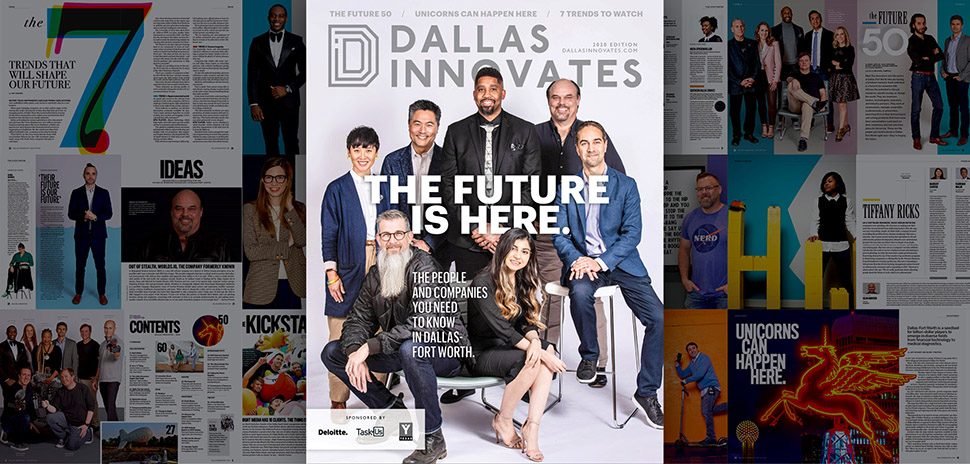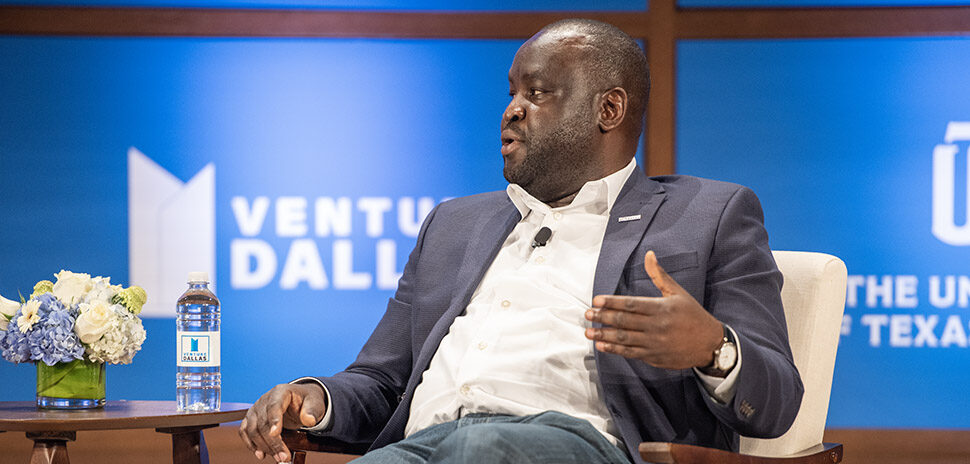Ultra-wealthy families are taking a more active interest in venture capital, often compelled by the potential for higher returns and the opportunity to invest in innovative and disruptive technologies.
While the trend of family offices investing in venture capital is by no means exclusive to North Texas, Aaron Pierce thinks Dallas in particular is an interesting place to explore it. “We’ve got so many family offices,” the Perot Jain partner and Venture Dallas chair said. “There are so many companies that are looking to grow here, and families are where they turn.”
As more and more family offices seek these opportunities, it’s increasingly important to understand their strategies for finding success in the venture landscape.
Pierce, who has a background in the family office space, is uniquely suited to lead a discussion on the topic. He previously was managing director at JF2 Capital Partners, a family office venture capital firm. Before that, he worked at J.P. Morgan Chase advising large family offices, entrepreneurs, and corporate executives on investment management and portfolio construction.
Pierce talked with Allie Laborde, principal of the Stephens Group; David Luttrell, chief investment officer with LCM Group; and Sam Weatherford, partner with Weatherford Capital, about their perspectives at Venture Dallas’ annual conference late last year. Here are some key takeaways from their conversation.
‘You’ve got to know yourself’
Venture capital is taking root in Dallas, according to Sam Weatherford, a partner at Weatherford Capital who has some 20 years of experience in the industry. Weatherford expressed excitement about the potential of the area and its growing venture ecosystem. The investor, who relocated to North Texas, previously lived and worked for eight years in China, where he was involved in venture capital investments for an American family.
His family-owned private investment firm, Weatherford Capital, was started in 2015 with a focus on investing in companies that the family knew, in industries they understood and could “add value” to, he said.
“We started off early on as private equity,” he said. “Then we went to venture capital. Now we’ve settled on the growth equity space. A lot of times people view what we do as venture.”
In reviewing the last 10 deals the firm has done over the past three years, Weatherford found the average check size was $30 million. He said the firm has found success in niche areas such as government, technology, and insurance technology, due in part to its family background.
Venture capital is an area that more families should be investing in, Weatherford said, the current tenuous economy aside.
“This is going to be the best time in the next 15, maybe 20 years to be deploying capital.”
“If you’re scared of venture … you might be more scared now than you ever were when you see this market turnover,” he said in November. “But as a smart investor, you recognize that now is actually the best time to be allocating capital to venture. This is going to be the best time in the next 15, maybe 20 years to be deploying capital.”
Weatherford suggests that families should consider investing in venture capital through REITs or with a “fund of funds” approach, rather than trying to run their own venture capital team in-house. He advises families to consider their own competencies and investment theses when deciding how to invest in VC.
“I think if your family has a very specific core competency, whether it’s real estate or a particular operating business, there’s an opportunity to understand that and figure out where technology is playing a role in that industry, where the trend line is going, and ride that wave,” he said. “Or it could be a past industry that you were involved in, and you really have a strong thesis in regards to where that’s going, and you want to build out a team in-house to go after that thesis because you have a really strong conviction of where the industry is headed … and you like to be in the lead.”
For families without a core competency or a strong investment thesis, Weatherford suggested that a “fund of funds” may be a good place to start. “Because part of running a team in-house is really hard,” he said. “It’s really hard to recruit and retain a top-brass team that’s going to get incredible deal flow, be able to do the due diligence that you need, to add value when there’s other venture growth equity shops out there looking to recruit them and give them large salaries, participate in a substantial equity upside.
“The family office structure oftentimes doesn’t compete as well as the private markets,” he added. “And so you’ve got to know yourself, kind of understand exactly where you think the world should be, and then figure out where you want your pieces to be on the board.”
A nimble approach
Allie Laborde, principal of the Stephens Group, works for the Stephens family, a well-known name in private business investing and a prominent player in the tech industry for more than 90 years. Based in Little Rock, the Stephens family office has a senior associate in Dallas, Callie Blankenau.
The family has a diverse portfolio that has evolved over time, with a “lot of time” in fintech as well as communications, infrastructure, and technology in general, Laborde said at the Venture Dallas conference. However, as more infrastructure funds entered the market with “different return thresholds,” the Stephens family shifted its focus toward the software side, she said.
Today, the family invests mainly in growth equity, with a focus on Series B, Series C, and later rounds of funding. “We write checks typically of $10 million to $30 million, but can write up to $150 million,” Laborde said.
One of the key advantages of being a family office is the flexibility of the investment mandate, according to Laborde.
One of the key advantages of being a family office is the flexibility of the investment mandate, according to Laborde. “As the market evolves, the Stephens family is able to adapt their strategy and invest in what makes sense in the current environment,” she said. “This nimble approach has served them well, and they continue to use it in their investment decisions today.”
Venture and tech make up about 40% of the family’s portfolio, with the remainder consisting of more traditional buyouts and industrials, Laborde said. The family office has close to $2 billion in private equity assets under management, covering a wide range of classes such as venture and growth.
The Stephens family’s approach of partnering with other companies and being flexible in its investment strategy has been a key factor in its success over the years, with a portfolio spanning over 200 companies since the 1930s, Laborde said. While the family has had a number of big cash-flow generators, she added, its success is largely due to its partnerships with other families and businesses.
Examples include its investment in West Rock Coffee, a coffee business, and the Ford family, with whom it’s invested since the 1960s. The latter began as a communications infrastructure investment but has evolved “several times over,” she said.
Returns in venture investing tend to be more volatile, which makes a portfolio necessary for managing risk, Laborde said. However, Laborde’s firm, unlike more traditional private equity funds, prefers to do direct investing itself, focusing on slightly later-stage companies.
The firm also allocates a small portion of its fund to co-invest with larger funds that invest in bigger businesses. While the firm has an in-house operations team, she added, it can’t compete with some of the “big powerhouses” due to the difference in team size and velocity.
Getting to a ‘sweet spot’
David Luttrell, a representative of the single-family-office LCM Group, described how his family office might differ from others.
He said his father, the patriarch of the firm, is a calculated risk-taker who launched a hedge fund in the early 1980s, when that was a nascent asset class. “He’s humble in saying, ‘Right time, right place. It was easy to make money for 20 years,’ ” Luttrell said.
The family office was started after his dad reached a point “where venture seemed to fit the bill,” and he wanted to “get out there on the long-term equity risk-taking spectrum,” he added.
Luttrell, who has a background in business and worked on Sand Hill Road in Silicon Valley, took over the family office about five years ago. He said he looks for the potential in investments to “touch human flourishing,” viewing venture investing as a way to contribute to high-impact outcomes while also generating returns for the family. “Venture can sometimes get us in a sweet spot in between where we feel like we can actually contribute to some high-impact outcomes,” he said at the conference.
As an economist and speechwriter for former Dallas Fed president Richard Fisher, Luttrell approaches the subject of building an in-house team with a balanced perspective, noting that venture investing is one area where LCM chooses to outsource. The firm typically insources most of its investment activities, he said, hiring managers who have the expertise and ability to build a portfolio. “And ironically, because of the payload, we don’t invest in funds today,” he added.
However, Luttrell said, the co-investment access that can sometimes come with VC managers “is a great way to learn.”
He also noted the importance of starting simple and learning from experience, saying, “Sometimes, the best plan is having one, so I go with the ‘start simply/simply start’ method.” His office, which has been around for 34 years, has been involved with startups from pitch and ideation to a publicly traded company, with his father serving on the audit committee—and helping with strategic takebacks. “We call it the wheel of fun,” he said.
Luttrell stressed the importance of identifying the areas where innovation is likely to occur and the role of startups in driving that innovation.
“That economist training of Joseph Schumpeter’s ‘creative destruction’—there’s something about the innovative engine of being involved with startups that I think every family office should be evaluating.”
“Startup is where the innovation happens.”
“If you want to pick your spots on where innovation is going to occur, I mean, a lot of us probably in the room know the startup founder that made my shirt, the socks I’m wearing, the boots I have on—these are people we appreciate and respect,” he said. “And while we don’t do a lot of consumer-oriented venture investing, it touches our lives in such a tangible way–the products we use, the services our businesses are engaged in. Startup is where the innovation happens.
“That economist training of Joseph Schumpeter’s ‘creative destruction’—there’s something about the innovative engine of being involved with startups that I think every family office should be evaluating,” he said. “How we play it is something to figure out, but let’s start with a macro view of what we think is happening in the next decade.”
The role of families in VC
Pierce has seen more and more families getting involved in venture capital. The Perot Jain partner, who has a unique vantage point on the trend, having worked with a number of families who were “dipping their toe in” venture investment during his time at J.P. Morgan, sees that as a positive development.
“I think there’s so much value that [families] can add because, oftentimes, they had operating businesses where they gain deep expertise in certain industries that allow them to be a value-add investor,” said Pierce.
“Technology is not going anywhere.”
The percentage of value in the S&P index attributed to tech stocks rose from less than 1% in 1980 to around 32% in November, Sam Weatherford said, adding, “Technology is not going anywhere.”
It’s a shift that’s led many investors—particularly baby boomers managing family capital—to question what’s the appropriate allocation of venture capital within their portfolios.
The younger generation is shaping the future, and there’s a growing sense of optimism in the VC community, Weatherford said. The convergence of diverse industries within places like Dallas is seen as a potential driver of value creation through the involvement of wealthy families with unique insights and experience in specific industries, he added.
Pierce sees the increasing participation of second-generation family members in the tech sector as a positive development. “It’s exciting to see the second generation start to get involved in the tech,” he said. “Maybe it was the father or mother that created wealth. … I think that’s going to rise the tide and will lift all boats.”
Weatherford noted that while many baby boomers aren’t “classic tech guys,” they’re interested in tech and made a lot of money, and they’re the ones managing the capital that they’ve produced.
Allie Laborde added that family offices are often overlooked as potential partners for entrepreneurs but can be valuable assets. They have a flexible mandate and can offer support in terms of structure and timing, something an entrepreneur might need during a rough patch. She emphasized the importance of truly understanding the family office landscape, as it can be difficult to navigate.
“[Family offices] can be a really interesting partner for an entrepreneur or a company.”
“There’s a lot of family offices out there, and a lot of them kind of fly under the radar, sometimes intentionally, sometimes not,” Laborde said. But “they can be a really interesting partner for an entrepreneur or a company.
“If something’s going really well, they can stay in longer,” she said. “If something’s not going really well, they can stay in longer.”
But what does it all mean for startups?
Good companies are out there raising money, Pierce noted late last year, adding that he was seeing more deals than ever.
But, he said, “I don’t think we’ve seen the valuations actually reflect what you see in the public markets.”
So, what should entrepreneurs be doing in the current environment—and how can they work better with investors?
Weatherford advises entrepreneurs to focus on quality. That includes doing “everything you can to build a quality team, because the only thing … where you can always get an opportunity for a greater-than-10-times return is not just technology, it’s the people that you surround yourself with—the people that you invest into, the people that you partner with,” he says. That applies to putting together a deck, too: Think “quality, quality, quality.”
Laborde suggests that entrepreneurs refine their message when approaching investors. “When you’re approaching someone and asking for capital, have a clear, tailored message: ‘I reached out to you because you have a background in insurtech,’ or whatever it may be, or ‘I saw that the family has invested in this 30 years ago,’” she counsels. “Make it clear it’s not just a blanket email that went out to 50 people.”
But once a startup has investors, Luttrell advises founders to engage and utilize them.
“Once you have acquired an investor, too many entrepreneurs or funds then do a poor job of utilizing them.”
“Once you have acquired an investor, too many entrepreneurs or funds then do a poor job of utilizing them. You’ve already captured a customer—you already have your investor.”
Still, like everything in family offices, there’s not a one-size-fits-all approach, Luttrell says. “It’s probably ‘one-size-fits-one.’ Transparency and the ability to communicate effectively are important. That doesn’t mean showing up with ‘This is a huge problem that we’ve had for the last six months,’ or, ‘Can you fund us in the next 10 days?’”
It’s important to know who your investor is, to involve them in problem-solving, and to make them part of your team, Luttrell says. “There’s an authenticity in the way we evaluate all investments at our family offices: People. Asset. Deal.”
A version of this story was originally published in Dallas Innovates 2023.
Read Dallas Innovates 2023 online
Take a journey into the heart of North Texas business. Our annual magazine takes you on a tour of the innovative and creative forces shaping the future.
WHAT ARE YOU INNOVATING? Let us know.
![]()
Get on the list.
Dallas Innovates, every day.
Sign up to keep your eye on what’s new and next in Dallas-Fort Worth, every day.


































































